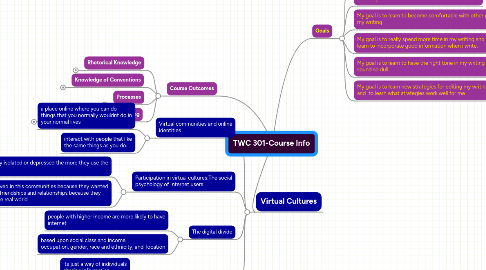
1. Course Outcomes
1.1. Rhetorical Knowledge
1.1.1. Focusing on a define purpose
1.1.2. Responding to the need of the appropriate audience
1.1.3. Respond appropriately to different rehetorical situations
1.1.4. Use conventions of format and structure appropriate to the rhetorical situation
1.1.5. Adopt appropriate voice, tone, and level of formality
1.1.6. Understand how each genre helps to shape writing and how readers respond to it
1.1.7. Write in multiple genres
1.1.8. Understand the role of a variety of technologies/media in accessing, retrieving, managing, and communicating information
1.1.9. Use appropriate technologies to organize, present, and communicate information to address a range of audiences, purposes, and genres
1.2. Knowledge of Conventions
1.2.1. Learn formats for different genres
1.2.2. Develop knowledge of genre conventions ranging form structure and paragraphing to tone and mechanics
1.2.3. Understand and apply legal and ethical uses of information and technology including copyright and intellectual propety
1.2.3.1. Copyright has all rights reserved and creative commons has only some right reserved.
1.2.3.2. Fair use is when you have the right to use material that is copyrighted without permission or payment under some circumstances
1.2.3.3. copyright-Always have to ask permission
1.2.3.4. when time of protection of copyright expires the information belongs to the public domain.
1.3. Processes
1.3.1. Be aware that it usually takes multiple drafts to create and complete a successful text
1.3.2. Develop fexible strategies for generating, revising, editing, and proof-reading
1.3.3. Understand the collaborative and social aspects of research and writing processes
1.3.4. Use appropriate technologies to manage data and information collected or generated for future use
1.4. Critical Thinking, Reading, and Writing
1.4.1. Use information, writing, and reading for inquiry, learning, thinking and communicating
1.4.2. Integrate previously held beliefs, assumptions,and knowledge with new information and the ideas of others to accomplish a specific purpose within a context
2. Virtual Cultures
2.1. Virtual communities and online identities
2.1.1. a place online where you can do things that you normally wouldnt do in your normal lives
2.1.2. interact with people that like the same things as you do.
2.2. Participation in virtual cultures:The social psychology of Internet users
2.2.1. people become more socially isolated or depressed the more they use the Internet
2.2.2. many people where involved in this communities because they wanted the opportunity to form friendships and relationships because they found it difficult out in the real world
2.3. The digital divide
2.3.1. people with higher income are more likely to have internet
2.3.2. based upon social class and income, occupation, gender, race and ethnicity, and location
2.4. Social capital and social software
2.4.1. its just a way of individuals charing information
2.4.2. it may be one of the biggest causes for the increase in crime rates, drug abuse, and a growing distrust of the governement
